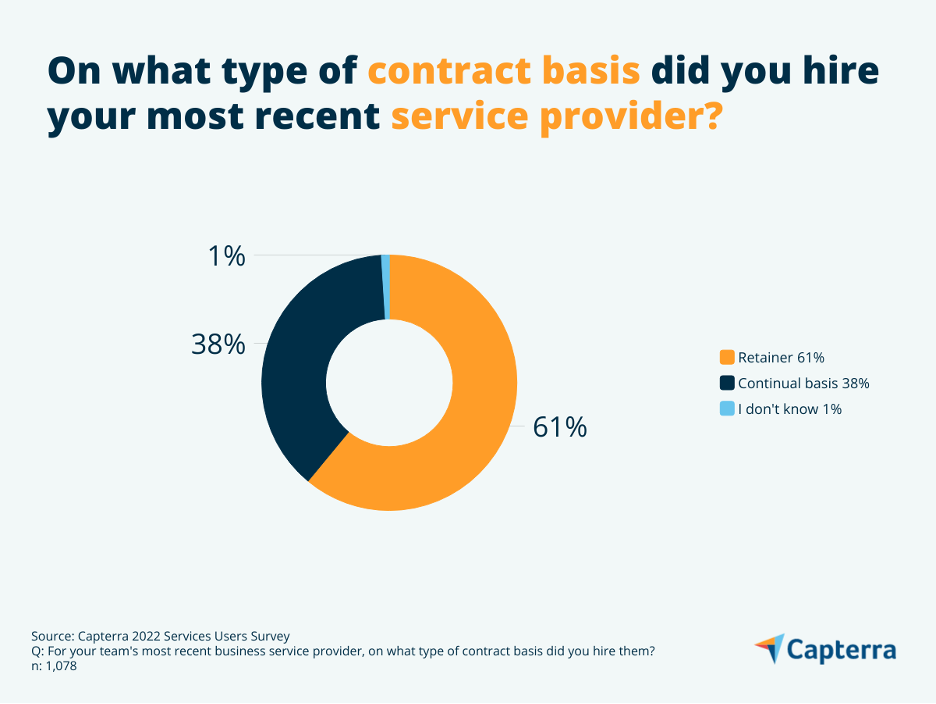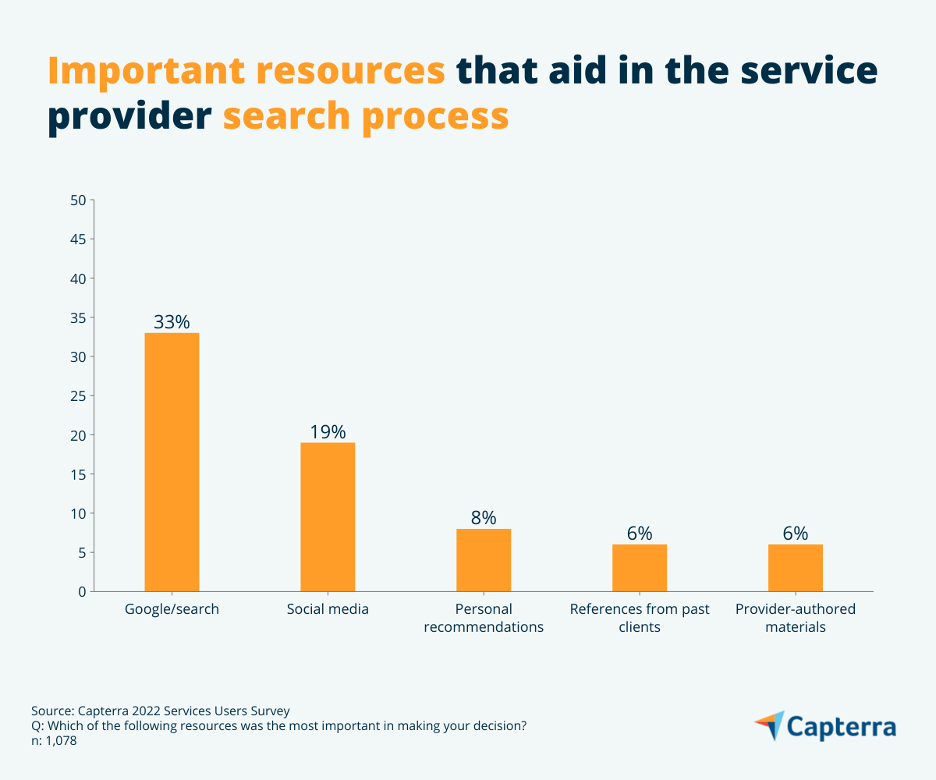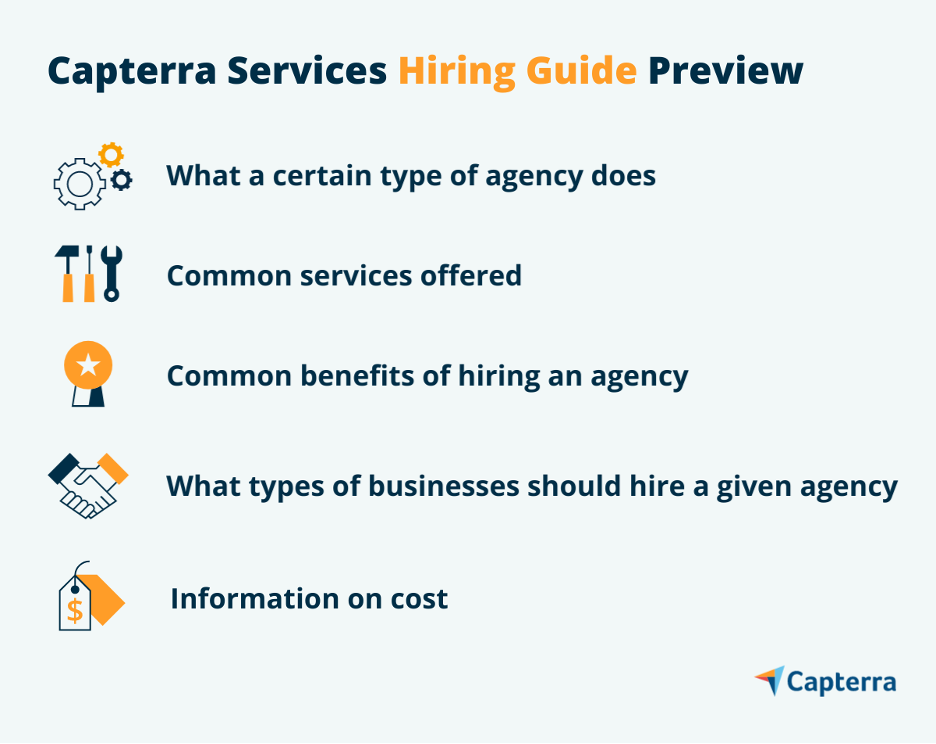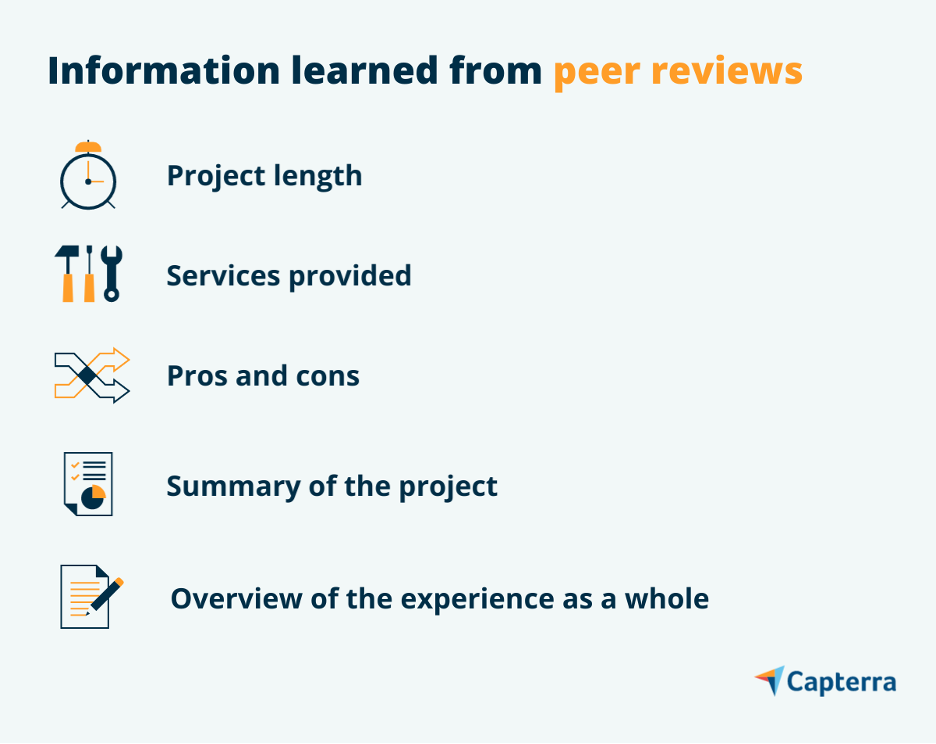Ready to start the search for outside help? First, ask yourself these questions.
If you’re a small business leader embarking on the process of hiring a service provider (potentially for the first time), it’s crucial to be thoughtful as you prepare. The last thing you want when hiring a service is to realize halfway through the selection process that you should have spent more time sourcing options or better defining contract terms.
Small business leaders who are hiring a service provider for the first time are especially vulnerable to missteps like these since they may not know what kind of information is most important to have on hand before kicking off their search.
To that end, we'll share three key questions you need to ask yourself based on insights from a survey* of business leaders who recently hired a service provider of their own.
Why hire a service provider, and what does it take?
Outside service providers offer many benefits over doing things solely in house. Visit our article Here's What You Can Expect When Hiring A Service Provider to learn more about the benefits of hiring one and the phases of the search process.
Free download
Download our free Service Provider Scorecard and assess your service providers.
Question #1: What kind of service provider contract are you looking for?
The first question to ask yourself before beginning the search process is what type of contract best suits this relationship?
Retainer
Hiring a service provider on retainer represents an ongoing relationship that ensures you have support whether or not you have a specific initiative to task them with. This type of contract is best suited for organizations that need general help with their business dealings—whether it’s daily tasks, ongoing reporting, or strategic planning.
How much does a service hired on retainer cost?
Services hired on retainer typically follow an hourly pricing model where you pay a specific amount for every hour of work the agency does. While most agencies follow an industry-standard rate, you may choose to have a custom pricing structure especially if you want to hire more experienced specialists.
Project based
Hiring a service provider on a project-specific basis is more for one-off initiatives that require outside support or expertise. Some examples include product launches, large events such as conferences, or backend projects including site migrations, data security, and website development.
How much does a project-based service provider cost?
Many services follow a pricing model wherein they estimate the entire project cost with the client beforehand. This model works best for long-term marketing projects. Agencies that follow a project-based model usually ask for an upfront fee of 15-20% at the start of the project.
In Capterra’s 2022 Services Users Survey*, we surveyed 1,078 past service purchasers from US-based small to midsize businesses to see how they navigated the process. We found that 61% of SMBs hired services on a retainer or continual basis while 38% hired on a project-specific basis.

Interestingly, out of the 1,078 services users surveyed, 331 of those ended up switching their contract approach, listing changes in scope and cost savings as the most cited reasons. This means that—while businesses may initially determine one method is appropriate—they often alter course based on changes to the project.
Ultimately, it’s okay—and even common—to switch your contract approach, especially if it ends up benefiting your bottom line. When planning out a project that a service provider will help with, pay special attention to scope creep and the effects it could have on your partnership. Getting this right early will help you save money at the outset and potentially time and energy managing a continual relationship in the long run.
/ Making use of this finding for my business
Seek to fully understand the capacity in which you're hiring the service provider before you begin the search process. It's possible that as you dig into the requirements for your growth areas you might realize the answer is different than you originally thought.
Question #2: Is there a list of pre-approved options guiding your search process?
The next big question after settling on the type of service contract is to determine how you’ll be finding your new provider.
According to our survey data, 18% of SMBs do not undergo a search process for a service provider. Of those, 52% need to choose from a list of approved vendors and 35% choose a vendor that an internal stakeholder has in mind.*
On one side of the coin: Having some guardrails for your provider choice can be a good thing. Narrowing down your options from the outset means you can spend more time researching and vetting the ones provided.
On the other side of the coin: This type of internal oversight may mean that you have to choose from less-than-stellar options, especially if you’re not fully empowered to engage in your own search process.
If you find yourself faced with a list of pre-approved vendors that don’t check all the boxes, it’s okay and sometimes encouraged to push back with the recommendation that outside options be considered as well. This may involve building a case for the options you’d like to vet then presenting it to internal decision makers.
Do this by creating a deliverable (a one-sheeter, presentation, etc.) that outlines at a high level the benefits of the providers you’re hoping to add to the pre-approved list, including things like standout features of their service, their reputation, or positive reviews.
One key benefit of conducting your own search process is the likelihood that you’ll be able to rehire a given provider. Researching, vetting, and hiring an option of your choosing increases that likelihood and decreases the time and energy required (as well as any potential friction) for subsequent hiring processes.
/ Making use of this finding for my business
Determine how much leeway you’ll have in choosing a service provider by contacting internal stakeholders, whether they be team leads, department heads, or the small business owner. This will guide your process from the outset and prevent you from spending unnecessary effort.
Question #3: What search methods are you using to make a hiring decision?
Now that you know what type of contract you’re seeking and the options available to you, how do you conduct a successful search? The answer for many boils down to Google and social media, but there are other more effective options available.
According to our research, 52% of SMBs use either Google (33%) or social media (19%) to conduct research on potential service providers while only 16% use methods such as comparison sites, personalized shortlists, Top 10 lists, or peer reviews.*

The question we have is: Why do extra work searching manually when others have already done the work for you?
Cursory Google searches and social media can give you a good sense of a brand's values and how they interact with others, but neither of these methods will give you a clear picture of their reputation—the element that the vast majority of SMBs credit to their confident decision.*
/ Making use of this finding for my business
Leverage insights from advanced resources to fill in the gaps left by regular search engines and social media. Peer reviews in particular give you a realistic view into what it’s like to work with a provider, especially when they come from businesses that mirror your growth stage.
In order to get a good sense of the kind of experience you can expect, peer reviews and insights are critical. Luckily for you, Capterra has a wealth of knowledge to help guide your decision in the form of hiring guides, shortlists, and peer reviews from small business owners just like you.
Capterra tools and tips: Maximizing the effectiveness of your quest for a service provider
Hiring Guides
Whether you’re searching for help with basic tasks like advertising and SEO or more complex endeavors like cloud computing and AI implementation, Capterra offers a wealth of knowledge in the form of hiring guides to aid in your decision making. These guides offer key information such as:

To take advantage of these guides, visit our Services Directory, click on the category you’re interested in, and visit the Hiring Guide link at the top of the page. There you’ll find everything you need to know to get your search started off strong.
Peer reviews
Just as useful but in a different way, peer reviews are an excellent resource to get real-world input on how a service provider performs, oftentimes from businesses just like you. Capterra peer reviews include an overall rating and likelihood to recommend scores as well as details like:

Once you find a listing you want to dive deeper into from our services directory, simply click into a product’s profile and visit the Reviews tab to see what others have to say about the service.
I’m ready for my search. Now what?
With all this in hand, you’re more than ready to get the most out of your next service provider relationship. Go forth confidently knowing that you have all the info you need to make a well-researched decision with the potential to yield a longstanding and fruitful relationship.
For more resources to help run your small business effectively, visit the Capterra blog and start here:
